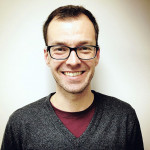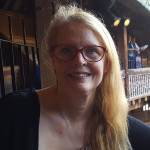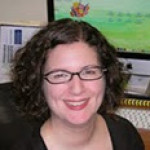Chairperson
Email: hdalley@daemen.edu
Phone Number: 716-839-8416
Office Location: DS 138-2
I’ve always enjoyed reading, but my path into teaching World and English literatures at Daemen University was a winding one. My first major was Anthropology because I wanted to be an archaeologist. That didn’t work out because before the end of the first semester I’d been seduced by my introductory English survey: a freewheeling ride through twentieth-century literature from James Joyce to Gertrude Stein to Philip K. Dick to Alan Ginsberg to Art Spiegelman, and beyond. The ENG130 lecture theatre at the University of Otago in 2002 was the kind of place I didn’t want to leave. Fortunately, I didn’t have to.
At Daemen, I try to share that excitement with my own students. I teach courses exploring literatures from all over the world, including Africa, South Asia, the Caribbean, and Japan. I try to open up unexpected connections and juxtapositions. For example, one of my favourite courses is “Myths and Modern Tales,” which starts with a selection of major works from the ancient Mediterranean (like The Odyssey and Sophocles’ Antigone), then skips forward two thousand years to see how modern writers have responded to the classical tradition. Part of the excitement of literary studies lies in how it can challenge us with new perspectives, so I want my teaching to create associations we might not have considered before.
My research falls within the subfield called “postcolonial studies,” which focuses on the legacy of European imperialism in places like Australia, India, and West Africa. I’ve written about how authors use fiction to re-examine the colonial frontier and challenge myths of white superiority, and have worked on how literary realism is transformed by authors from outside the usual centres of global culture. My most recent work is about the relationship between the novel and settler colonialism. I'm interested in how writers from frontier societies in North America, Australasia and Africa have remade the novel by writing interesting - and often strange - stories about the colonization of ‘New’ Worlds.
Faculty
Email: martman@daemen.edu
Phone Number: 716-839-7680.
Office Location: DS 138-9
Dr. Artman teaches composition, journalism, public relations, and professional/technical writing. Also, she advises the student newspaper, Insight. Her research interests include student media and advising, information literacy, and writing pedagogy. Her work has been published in College Teaching, Composition Studies, and Teaching Information Literacy and Writing Studies: First-Year Composition, vol 1, First-Year Composition Courses.
Email: nmarck@daemen.edu
Phone Number: 716-839-8541
Office Location: DS 138-3
British Literature, Shakespeare, Women Writers, the Novel, and Critical Theory
I like to teach British literature from a “time machine” or historical perspective by imagining and examining the culture that produced the texts we study. For instance, in my Shakespeare class, you’ll receive a weekly news pamphlet containing all the latest events in Shakespeare’s London, so we can talk about the news that emerges in his plays. I am keenly interested in the intersections between the visual arts, performance, and literary texts, so I regularly employ film and illustrations as they help us enjoy our reading and deepen our textual understanding. I offer survey courses as well as more advanced courses in Shakespeare, the gothic, 19 th century literature, and drama.
Most of my scholarly work investigates texts produced by nineteenth-century women novelists from England, Scotland, and Ireland. My recent publications include journal articles on material culture (Thackeray’s Vanity Fair), on Irish gothic novels (Maria Edgeworth’s Castle Rackrent and Bram Stoker’s The Snake’s Pass), and on embodiment and substance abuse in novels by George Eliot. In recent years, I have also contributed book chapters to Jane Austen and Philosophy, The Contemporary Irish Detective Novel, Biographical Misrepresentation of British Women Writers, and Guilt Rules All: Irish Mystery, Detective, and Crime Fiction. Right now, I’m working on a variety of projects dealing with illustration, medicine, and scandal in the 19 th century novel.
Some of my favorite experiences as a faculty member have taken place outside the classroom—my Literature of London course involves a Spring Break trip to visit literary sites in London. I have also arranged weekend trips with students to visit literary sites in Massachusetts and overseen three Think-Tank grant projects that supported my work with students to research the 1692 Salem Witch Trials in Salem, MA and to examine Renaissance manuscripts in The British Library, London. I hope to have these wonderful learning experiences repeated in years to come.
Email: efrisica@daemen.edu
Phone Number: 716-839-8296
Office Location: DS 138-1
Rhetoric, Composition, and Professional Writing
Since my arrival at Daemen in fall 2008, I’ve been teaching a range of composition classes (basic, introductory, and advanced), as well as courses in Rhetoric, Professional Writing, and the English Language. I also serve as the Writing Coordinator, assisting students and faculty with composition placement, scheduling, and writing course instruction. Before coming to Daemen, I was an Assistant Professor of English at the University of St. Thomas in St. Paul, Minnesota. At UST, I taught a range of courses in rhetoric, composition, disciplinary history, and women’s literature for graduate and undergraduate students. Prior to my appointment at St. Thomas, I served as the Graduate Coordinator of Comp 101 at the University of Wisconsin-Milwaukee, where I specialized in Rhetoric, Composition, and Professional Writing and received my PhD in 2003.
I developed my interest in the study, teaching, and craft of writing early in my educational development, when I was fortunate to enroll in rhetoric and composition course work as an undergraduate student at Nazareth College. While I was always a voracious reader, studying the connections between writing, language, and learning gave me a different way to think about texts -– and a new way of understanding how writing works in the world. After one of my professors took me to my first conference for rhetoric and composition scholars during my senior year in college, I was hooked. And for nearly 15 years, I’ve had the good fortune to teach writing, to help others to work with student writers, and, from time to time, to do a bit of writing myself.
My scholarly interests include the history and development of Rhetoric and Composition Studies and, more recently, the influence of technology on students’ research writing practices. For example, in two recent studies, I worked with specialists in Composition and Library & Information Science to examine the relationships between rhetorical knowledge, writing practice, and information literacy at two points of transition crucial to writing development: as first-year students encounter research writing in introductory composition course work; and as graduating students transition from academic writing to professional writing. My work has been published in Composition Studies, Innovative Higher Education, and The Changing of Knowledge in Composition: Contemporary Perspectives (Massey and Gebhardt, eds.).
Email: cwesley@daemen.edu
Phone Number: 716-839-8577
Office Location: DS 138-office #4
My academic interests are not situated within a single national framework or period, as I focus on comparative and transnational approaches to literature. I enjoy teaching courses that place authors from around the world in dialogue with one another, creating the opportunity for the new and sometimes unexpected insights that emerge from these juxtapositions. Currently I am teaching or planning courses in German literature, the politics of food, exile/refugee literature, dystopian literature, and banned/censored books. In the past I’ve taught “Approaches to Literature,” “American Literature II,” “British Literature II,” “African American Literature,” and “Writing Composition.”
Recently I coedited a special edition of The Journal of Commonwealth Literature entitled “New Directions in Rushdie Studies” with Dr. Ana Christina Mendes (University of Lisbon). A recent article that demonstrates my postcolonial bent is entitled “Inscriptions of Resistance in Joseph Conrad’s Heart of Darkness” (Journal of Modern Literature). I’ve also published articles in The Geocritical Legacies of Edward W. Said, Modern Language Studies, Universitätsverlag WINTER Heidelberg, Indian Writers: Transnationalisms and Diasporas, and The Chronicle of Higher Education, with work forthcoming in Studies in the Novel. View several of my publications and CV.
At Daemen I strive to fuel students’ curiosity about and engagement with the larger world. When I’m not enjoying the many cultural delights of the Queen city, I’m usually somewhere in Europe.
Distinguished and Emeritus Faculty
- Peter Siedlecki
- Shirley Peterson
- Robert Morace






